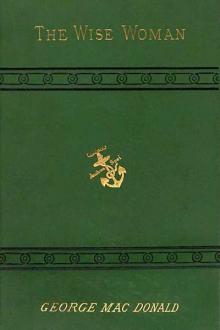The Wise Woman - George MacDonald (good books for high schoolers .txt) 📗

- Author: George MacDonald
- Performer: -
Book online «The Wise Woman - George MacDonald (good books for high schoolers .txt) 📗». Author George MacDonald
“I’ve nowhere to go to,” she sobbed. “Where’s your mother?” asked the soldier.
I don’t know,” answered Agnes. “I was carried off by an old woman, who then went away and left me. I don’t know where she is, or where I am myself.”
“Come,” said the soldier, “this is a case for his Majesty.”
So saying he took her by the hand, led her to the palace, and begged an audience of the king and queen. The porter glanced at Agnes, immediately admitted them, and showed them into a great splendid room, where the king and queen sat every day to review lost children, in the hope of one day thus finding their Rosamond. But they were by this time beginning to get tired of it. The moment they cast their eyes upon Agnes, the queen threw back her head, threw up her hands, and cried “What a miserable, conceited, white-faced little ape!” and the king turned upon the soldier in wrath, and cried, forgetting his own decree, “What do you mean by bringing such a dirty, vulgar-looking, pert creature into my palace? The dullest soldier in my army could never for a moment imagine a child like that, one hair’s-breadth like the lovely angel we lost?”
“I humbly beg your Majesty’s pardon,” said the soldier, “but what was I to do? There stands your Majesty’s proclamation in gold letters on the brazen gates of the palace.”
“I shall have it taken down,” said the king. “Remove the child.”
“Please your Majesty, what am I to do with her?”
“Take her home with you.”
“I have six already, sire, and do not want her.”
“Then drop her where you picked her up.”
“If I do, sire, some one else will find her, and bring her back to your Majesties.”
“That will never do,” said the king. “I cannot bear to look at her.”
“For all her ugliness,” said the queen, “she is plainly lost, and so is our Rosamond.”
“It may be only a pretence, to get into the palace,” said the king.
“Take her to the head scullion, soldier,” said the queen, “and tell her to make her useful. If she should find out she has been pretending to be lost, she must let me know.”
The soldier was so anxious to get rid of her, that he caught her up in his arms, hurried her from the room, found his way to the scullery, and gave her, trembling with fear, in charge to the head maid, with the queen’s message.
As it was evident that the queen had no favour for her, the servants did as they pleased with her, and often treated her harshly. Not one amongst them liked her; nor was it any wonder, seeing that, with every step she took from the wise woman’s house, she had grown more contemptible, for she had grown more conceited. Every civil answer given her, she attributed to the impression she made, not to the desire to get rid of her; and every kindness, to approbation of her looks and speech, instead of friendliness to a lonely child. Hence by this time she was twice as odious as before; for whoever has had such severe treatment as the wise woman gave her, and is not the better for it, always grows worse than before. They drove her about, boxed her ears on the smallest provocation, laid everything to her charge, called her all manner of contemptuous names, jeered and scoffed at her awkwardnesses, and made her life so miserable that she was in a fair way to forget everything she had learned, and know nothing but how to clean saucepans and kettles.
They would not have been so hard upon her, however, but for her irritating behaviour. She dared not refuse to do as she was told, but she obeyed now with a pursed-up mouth, and now with a contemptuous smile. The only thing that sustained her was her constant contriving how to get out of the painful position in which she found herself. There is but one true way, however, of getting out of any position we may be in, and that is, to do the work of it so well that we grow fit for a better: I need not say this was not the plan upon which Agnes was cunning enough to fix.
She had soon learned from the talk around her the reason of the proclamation which had brought her hither.
“Was the lost princess so very beautiful?” she said one day to the youngest of her fellow-servants.
“Beautiful!” screamed the maid; “she was just the ugliest little toad you ever set eyes upon.”
“What was she like?” asked Agnes.
“She was about your size, and quite as ugly, only not in the same way; for she had red cheeks, and a cocked little nose, and the biggest, ugliest mouth you ever saw.”
Agnes fell a thinking.
“Is there a picture of her anywhere in the palace?” she asked.
“How should I know? You can ask a housemaid.”
Agnes soon learned that there was one, and contrived to get a peep of it. Then she was certain of what she had suspected from the description given of her, namely, that she was the same she had seen in the picture at the wise woman’s house. The conclusion followed, that the lost princess must be staying with her father and mother, for assuredly in the picture she wore one of her frocks.
She went to the head scullion, and, with humble manner but proud heart, begged her to procure for her the favour of a word with the queen.
“A likely thing indeed!” was the answer, accompanied by a resounding box on the ear.
She tried the head cook next, but with no better success, and so was driven to her meditations again, the result of which was that she began to drop hints that she knew something about the princess. This came at length to the queen’s ears, and she sent for her.
Absorbed in her own selfish ambitions, Agnes never thought of the risk to which she was about to expose her parents, but told the queen that in her wanderings she had caught sight of just such a lovely creature as she described the princess, only dressed like a peasant—saying that, if the king would permit her to go and look for her, she had little doubt of bringing her back safe and sound within a few weeks.
But although she spoke the truth, she had such a look of cunning on her pinched face that the queen could not possibly trust her, but believed that she made the proposal merely to get away, and have money given her for her journey. Still there was a chance, and she would not say anything until she had consulted the king.
Then they had Agnes up before the lord chancellor, who, after much questioning of her, arrived at last, he thought, at some notion of the part of the country described by her—that was, if she spoke the truth, which, from her looks and behaviour, he also considered entirely doubtful. Thereupon she was ordered back to the kitchen, and a band of soldiers, under a clever lawyer, sent out to search every foot of the supposed region. They were commanded not to return until they brought with them, bound hand and foot, such a shepherd-pair as that of which they received a full description.
And now Agnes was worse off than before. For to her other miseries was added the fear of what would befall her when it was discovered that the persons of whom they were in quest, and whom she was certain they must find, were her own father and mother.
By this time the king and queen were so tired of seeing lost children, genuine or pretended—for they cared for no child any longer than there seemed a chance of its turning out their child—that, with this new hope, which, however poor and vague at first, soon began to grow upon such imaginations as they had, they commanded the proclamation to be taken down from the palace gates, and directed the various sentries to admit no child whatever, lost or found, be the reason or pretence what it might, until further orders.
“I’m sick of children!” said the king to his secretary, as he finished dictating the direction.
CHAPTER XI.
After Prince was gone, the princess, by degrees, fell back into some of her old bad ways, from which only the presence of the dog, not her own betterment, had kept her. She never grew nearly so selfish again, but she began to let her angry old self lift up its head once more, until by and by she grew so bad that the shepherdess declared she should not stop in the house a day longer, for she was quite unendurable.
“It is all very well for you, husband,” she said, “for you haven’t her all day about you, and only see the best of her. But if you had her in work instead of play hours, you would like her no better than I do. And then it’s not her ugly passions only, but when she’s in one of her tantrums, it’s impossible to get any work out of her. At such times she’s just as obstinate as-as-as-”
She was going to say “as Agnes,” but the feelings of a mother overcame her, and she could not utter the words.
“In fact,” she said instead, “she makes my life miserable.”
The shepherd felt he had no right to tell his wife she must submit to have her life made miserable, and therefore, although he was really much attached to Rosamond, he would not interfere; and the shepherdess told her she must look out for another place.
The princess was, however, this much better than before, even in respect of her passions, that they were not quite so bad, and after one was over, she was really ashamed of it. But not once, ever since the departure of Prince, had she tried to check the rush of the evil temper when it came upon her. She hated it when she was out of it, and that was something; but while she was in it, she went full swing with it, wherever the prince of the power of it pleased to carry her. Nor was this all: although she might by this time have known well enough that as soon as she was out of it she was certain to be ashamed of it, she would yet justify it to herself with twenty different arguments that looked very good at the time, but would have looked very poor indeed afterwards, if then she had ever remembered them.
She was not sorry to leave the shepherd’s cottage, for she felt certain of soon finding her way back to her father and mother; and she would, indeed, have set out long before, but that her foot had somehow got hurt when Prince gave her his last admonition, and she had never since been able for long walks, which she sometimes blamed as the cause of her temper growing worse. But if people are good-tempered only when they are comfortable, what thanks have they? Her foot was now much better; and as soon as the shepherdess had thus spoken, she resolved to set out at once, and work or beg her





Comments (0)